EU, UK Summon Islamic Republic’s Envoys Over Executions
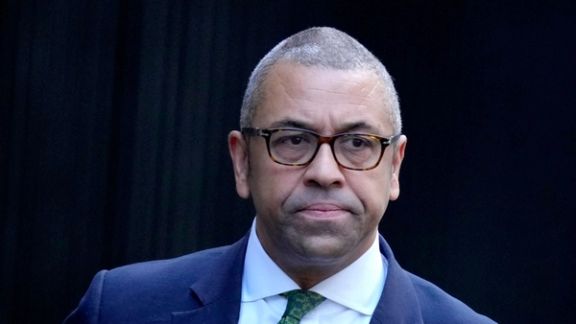
Global consequences of hanging of two more protesters continue for Iran with the EU and UK summoning the Islamic Republic’s ambassadors on Monday.

Global consequences of hanging of two more protesters continue for Iran with the EU and UK summoning the Islamic Republic’s ambassadors on Monday.
Stefano Sannino, the secretary-general of the European External Action Service (EEAS), reiterated the European Union's outrage to the ambassador, Hossein Dehghani, saying that the bloc is appalled by the executions at the weekend of two Iranians arrested in the course of the regime’s crackdown on anti-government protests, ignited by the death of Mahsa Amini in custody of hijab police.
He also repeated an EU call on the regime’s authorities to annul without delay death sentences already pronounced against other protesters. Iran's judiciary said Monday that a court has sentenced three more protesters to death for “war against God”.
Earlier in the day, Britain's foreign minister James Cleverly summoned Iran’s most senior diplomat on Monday after Iranian authorities executed protestors Mohammad Mahdi Karami and Seyyed Mohammad Hosseini."Today I have summoned the Iranian Chargé d’Affaires to condemn in the strongest possible terms the abhorrent executions we witnessed over the weekend," he said in a statement.
The two men were hanged on Saturday for their alleged role in the killing of a government agent during protests that followed the death of Amini, creating uproar in the international community against the Iranian regime.The latest execution brings the number of protesters officially known to have been executed since the unrest to four.
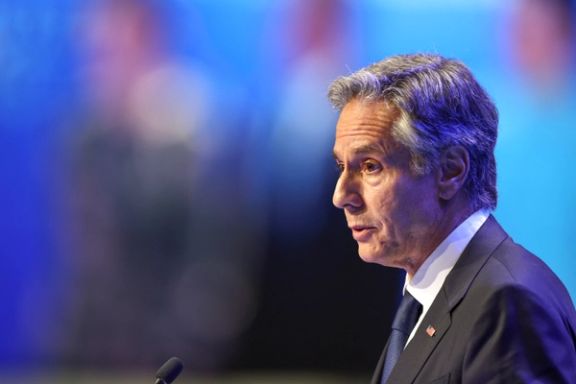
Two top United States officials are due this month to visit Israel’s new government, but analysts are not expecting new US regional initiatives.
Jake Sullivan, the US National Security Advisor, said Monday in Mexico, accompanying President Joe Biden, that Iran would be a “substantial topic of conversation” for his trip. Dates were still being worked out, a US security spokesman said.
Sullivan said the two sides would have “the opportunity to engage deeply…on the threat posed by Iran.” Benjamin Netanyahu said it was “time for Israel and the US to be on the same page.”
Antony Blinken, the US Secretary of State, is also due in Israel this month, but officials up to Biden have intimated that their primary focus is not on the Middle East, but with the Russia-Ukraine war including the supply of Iranian drones to Russia and efforts to manage relations with China. Ben Shapiro, a former US ambassador to Israel, told the Jerusalem Post that the Sullivan and Biden visits did not “mean the Biden administration has changed its approach on where its highest priorities are – which is not in the Middle East.”

Sullivan reiterated Monday that while US policy aimed at reviving the 2015 Iran nuclear agreement, the JCPOA (Joint Comprehensive Plan of Action), this was not a focus for US officials. Some analysts argue US, while shifting energies elsewhere, has adopted a more militaristic approach inasserting a willingness – as the July joint statement with Israel put – to “use all elements of its national power” to ensure that “Iran does not acquire a nuclear weapon.”
Sullivan also said Monday that Iran could be contributing to war crimes in Ukraine by providing drones to Russia.
While this all lessens tension with Netanyahu, a vehement JCPOA opponent and supporter of President Donald Trump in pulling the US from the agreement in 2018, it suggests Washington is happy to offer Israel forms of military cooperation that may restrain any notions of a military attack on Iran while enabling the US, effectively, to ‘spy’ on Israel.
Clear nerves in Washington
At the same time, recent US statements of support for the ‘two state solution’ for Israel-Palestine show clear nerves that Netanyahu’s new right-wing government may both enflame the occupied West Bank and undermine the Washington-backed ‘normalization’ agreements Israel has signed with some Arab states.
Itamar Ben Gvir, the new ultra-Zionist security minister who controversially visited the al-Aqsa mosque in Israeli-occupied east Jerusalem on taking office, Sunday banned public displays of the Palestinian flag as showing “identification with a terrorist organization.”
The government also froze $40 million in revenue due to the Palestinian Authority (PA). Netanyahu defended both moves as a response to the late December United Nations vote asking for an International Court of Justice opinion on the 56-year Israeli military occupation. While Israeli police routinely remove the flag, especially at protests, it has officially been tolerated since the 1994 establishment of the PA, and the decision has sparked fears of continuing unrest and violence that saw 146 Palestinians killed in the West Bank in 2022.
Bahrain, Egypt, Morocco and the UAE turned up in Abu Dhabi Monday for a two-day steering committee of the ‘Negev Forum,’ under which the Arab states meet Israel and the US. But Jordan, whose ‘normalization’ with Israel goes back to 1994, stayed away. Bahrain, Egypt, Morocco and the UAE all voted for the US resolution – as did Iran.

A Norway-based human rights organization says at least 109 Iranian protesters are currently at risk of execution or facing death penalty sentences.
The Oslo-based Iran Human Rights Organization announced in its latest report that is a minimum estimate as most families are under pressure to stay quiet, and the real number is believed to be much higher.
The list includes both officially reported cases and those reported by family members and citizen journalists.
Since December 27 when it first released a list, nine people have been released on bail, one is no longer in custody, and two who were executed, have been removed.
21 other protesters who are at risk of death penalty charges, sentences or execution have been added to the current list, noted the human right body.
Iran Human Rights organization also stressed that repression through arbitrary arrests, physical torture, sexual assault and rape in detention and the mass issuance of sentences has been intensified.
“There have been enough cases reported throughout the country to conclude that it is not merely isolated incidents but a systematic policy by the government,” underlined the IHRNGO.
It also announced that at least 481 people including 64 children and 35 women, have been killed by security forces since mid-September, following the death of Mahsa Amini in police custody, which triggered the protests.
It further pointed out that the Islamic Republic is intentionally creating confusion by sharing contradicting statements, particularly in death penalty cases.
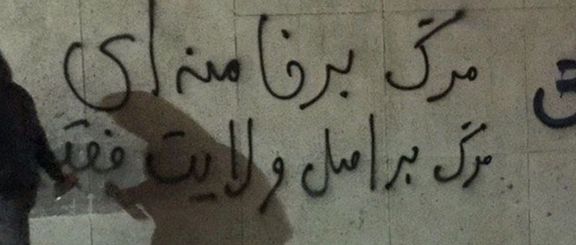
After numerous calls by Iranians and human rights activists against censoring content about ongoing protests in Iran, Meta, the owner of Instagram and Facebook, has revised its policies.
Meta's Oversight Board on Monday overturned the company's decision to remove a Facebook post that used the slogan "death to Khamenei" in support of the Iranians’ antigovernment protests, saying it did not violate a rule that bars “violent threats.”
The board, which is funded by Meta but operates independently, said in a ruling that the phrase is often used to mean "down with Khamenei" in referring to the Islamic Republic’s Supreme Leader Ali Khamenei, who has been leading the violent crackdown on nationwide protests ignited by the death in custody of 22-year-old Mahsa Amini.
The board underlined that "In the context of the post, and the broader social, political and linguistic situation in Iran, 'marg bar Khamenei' -- Persian for ‘death to Khamenei’ -- should be understood as 'down with.' It is a rhetorical, political slogan, not a credible threat.”
It also urged the company to develop better ways of factoring such context into its content policies and outline clearly when rhetorical threats against heads of state were permitted.
The protests, which are described as the biggest challenge to the clerical regime since its establishment in 1979, are also reflected in cyberspace by many Iranians and foreigners, creating a conundrum for Meta, which has wavered repeatedly in its treatment of violent political rhetoric on its platforms.
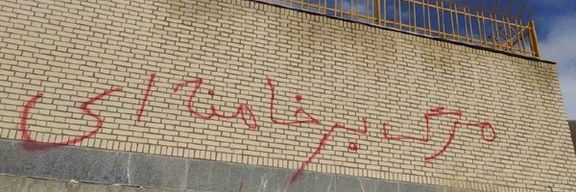
The company claims that it bans language that incites "serious violence" but aims to avoid overreach by limiting enforcement to credible threats, leaving ambiguity as to when and how the rule applies. After Russia invaded Ukraine last year, for example, Meta introduced a temporary exemption to allow calls for death to Russian President Vladimir Putin, aiming to give users in the region space to express their anger over the war, but days later it reversed the exemption.
Even before the current wave of protests, the company was accused of censoring content deemed critical of the Islamic Republic and its leaders. In August, following reports that the social media giant might be aiding the Iranian government amid a wave of protests, the US Congress launched an investigation into the claims. Three US Republican lawmakers on the House Foreign Affairs and Armed Services Committees launched a probe into the matter, and also urged Meta to investigate claims that Instagram has "been infiltrated by those sympathetic to the Islamic Republic in Iran."
The probe came following reports alleging that Instagram content moderators are deleting and censoring accounts that have documented the regime’s human rights abuses during the protests, including content showing Iranian security forces beating protesters and firing tear gas into crowds.
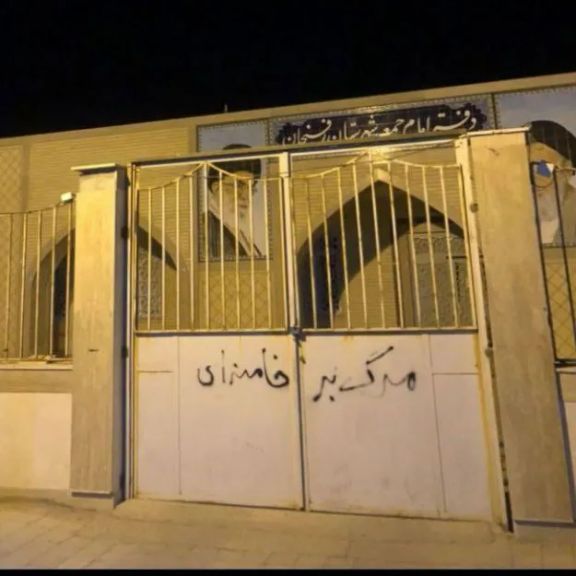
BBC’s sources alleged that pro-regime employees of the German branch of Telus International, a Canadian contractor which provides content moderation to Instagram with over 400 Iranian employees for reviewing Persian-language content, are responsible for restricting anti-government content of Iranian users. In an investigative report, Deutsche Welle Farsi revealed that Mehdi Norouzi, the son of a former Islamic Republic envoy to Bulgaria -- Abdollah Norouzi, works at the Telas International branch in Sofia.
In October, three human rights groups, namely digital civil rights group Access Now, London-based rights organization Article 19, and New York-based Center for Human Rights in Iran, met with a senior official from Meta to convey their concerns over the company censoring content by Iranian dissidents and democracy advocates. The groups said they made recommendations to Meta and Meta’s Oversight Board in an effort to streamline processes to ensure freedom of expression is protected for users who rely on their platform in Iran, especially during protests.
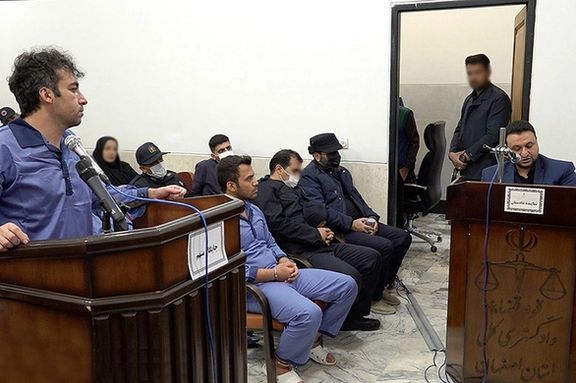
Amid outrage over the execution of two protesters Saturday, Iran's judiciary said Monday that a court has sentenced three others to death for “war against God”.
The three men – Saleh Mir-Hashemi, Majid Kazemi, and Saeed Yaghoubi –were charged with ‘moharebeh’, meaning “war against God”, a vague religious concept, for their alleged role in the shooting of three government agents during a day of protests at Khane-ye Esfahan neighborhood on November 16.
The ‘Khane-ye Esfahan case’ involves several other protesters. Another defendant, footballer Amir Nasr-Azadani, was sentenced to a total of twenty-one years in prison on charges of “aiding in the war against God and “assembly and collusion leading to security-related crimes”.
The sentences can be appealed, the judiciary said, but in other cases involving protesters, the appeal process has not overturned verdicts in sham trials.
The convictions were based on confessions made in the absence of lawyers appointed by the accused. As in many other security-related cases, the judiciary has published videos in which the accused confess to the crimes they were charged with.
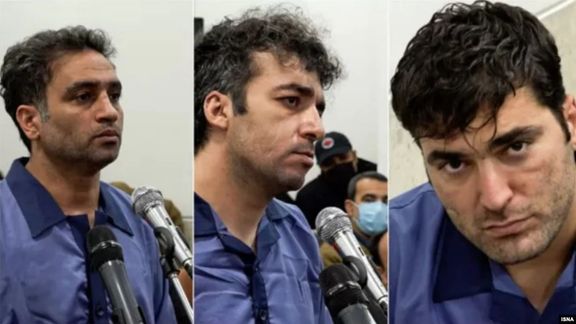
Many security prisoners who have made such confessions, usually for television audiences, later recanted saying they were made under torture and duress.
In 2019, Mazyar Ebrahimi, a businessman, disclosed how he was tortured non-stop for forty days by the intelligence ministry into confessing to spying for Israel and assassinating Iranian nuclear scientists between 2010 and 2012.
Ebrahimi’s confessions were broadcast by the state broadcaster (IRIB). He also said the judge who tried him and others on these bogus charges, Abolghasem Salavati constantly threatened them with a death sentence to make them accept “to cooperate” with their interrogators and accept to play in the script they had written.
Salavati has recently sentenced several protesters, including Mohammad Beroghani and Saman Seydi, to death.
In a rare incident, Ebrahimi and others were exonerated when the rival IRGC intelligence found discrepancies in the testimonies fabricated by the intelligence ministry.
The Islamic Republic has so far hanged four protesters: Mohsen Mirshekari in Tehran and Majidreza Rahnavard in Mashhad on December 12, and Mohammad-Mehdi Karami and Seyed Mohammad Hosseini in Karaj on Saturday.
“Mohammad-Mehdi Karami and [Seyed] Mohammad Hosseini were both executed in gross violation of the law and their right to have appointed attorneys,” prominent human rights lawyer Nasrin Sotoudeh said in a Facebook post Monday.
“The right to freely choose a lawyer is one of the most important reasons for the faultiness of these [death and prison] sentences,” she wrote, adding that hasty executions are “sheer murder” by lack of due process in the trials.
Hosseini’s lawyer, Ali Sharifzadeh-Ardakani, who was only allowed to represent him after the trial said that the judiciary carried out the executions so hastily that they had no time for taking any legal action in these cases. “I was on my way to the Supreme Court [to apply for a re-trial] when I heard my client had been executed,” he said in a tweet Saturday.
Sharifzadeh-Ardakani was summoned by the public and revolutionary prosecutor of Karaj on Tuesday, a day after his client was hanged, charged with “propaganda against the regime” for speaking about his client’s tortures. He was released on bail on the same day.
“I met with Seyed-Mohammad [Hosseini] at Karaj Prison [for the first time]. He cried through his account of tortures, being beaten with tied hands and legs and blindfolded, to being kicked in the head and losing consciousness, the soles of his feet beaten with an iron rod to being tased in different parts of the body,” Sharifzadeh had said in a tweet on December 18.
Mohammad Aghasi, the lawyer of Mohammad-Mehdi Karami, also said in an interview that “They executed my client so quickly that they didn't even give him a chance to write a petition for retrial.”

Pope Francis has slammed the use of the death penalty by the Iranian regime to quell nationwide anti-government protests.
The Pope’s remarks are his first public comments against the Iranian clerical rulers over the protests’ crackdown.
In his annual speech to diplomats accredited to the Vatican on Monday, he said “The right to life is also threatened in those places where the death penalty continues to be imposed, as is the case in these days in Iran, following the recent demonstrations demanding greater respect for the dignity of women.”
“The death penalty cannot be employed for a purported state justice, since it does not constitute a deterrent nor render justice to victims, but only fuels the thirst for vengeance,” he stressed.
These statements by Pope Francis are expressed in a situation that the Islamic Republic has so far executed four protesters and issued death sentences for several others.
Iran has been the scene of nationwide protests after the death of Mahsa Amini in ‘hijab police’ custody in mid-September.
Earlier, the Pope had refused to comment on Iran protests and the role of women after his trip to the region.
The execution of protestors in Iran has drawn a wave of international condemnations, but the Islamic Republic still issues new death sentences against some detained demonstrators.